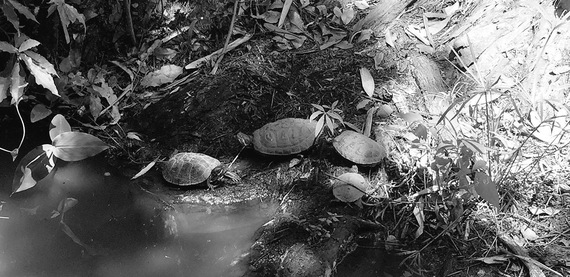Earlier this week, an article came out in the New York Times, entitled "against sustainability"
This article was viscerally upsetting and compelled me to write this piece in response:
In a perfect example of hubris, "Against sustainability" argues that nature, the environment, and "resources," are ours for the taking, to do with them as we please. Which, in fact, we pretty much do.
This is a highly biased, and Anthropocentric view of the world, one which does not take into consideration evolution, and our destructive ways against the world. Modern humans (Homo sapiens) more or less fully evolved in the last 100,000 years. And in this time-frame, and even more specifically, in the last 150 years, we have managed to cull large proportions of most species.
Many of the flora and fauna that exist on Earth and in our oceans today evolved hundreds of millions of years ago. For example, the shark evolved some 400 million years ago. Today, most shark species have declined by over 90% or more. Why? Because they get caught in fishing nets, or more importantly, because humans eat them in shark-fin soup; a soup that tastes like nothing.
Slaughtering elephants for their tusks, an elephant-tooth, known as "ivory" is sure not for human survival. It's for a trinket, or an ornament, often fueling terrorist or other illicit organizations.
Murdering rhinoceros for their horns, so that now there are fewer than 25,000 of them, is not for human survival. It's for an "aphrodisiac" with absolutely no proven effects. Thus, the arguments made in "against sustainability" that we preserve things simply for our consumption are base.
The background rate of extinction is about one to five species per year. However, the current rates of extinction, since humans figured out how to cull and mass execute animals, has been 1,000-10,000 times faster than those back ground rates. This is a fact.
Humans are the most destructive species on the planet. We do not use our fair share of the natural resources. Our cities utilize mass amounts of natural and fabricated resources. And our cities are growing. Nearly half of all people live in cities, and this is increasing.
We are reckless with our use of fossil fuels. We are reckless with our fishing methods, destroying ecosystems, habitat, and throwing away unintended fish species.
We are reckless with our clear-cutting of forests, fracturing animal lives. We are reckless in our dietary habits; fueling deforestation.
It is never excusable to say "Mass extinctions are only tragic if nature is viewed as something perfect that we are destroying, rather than as a state of flux in which we are participating."
Extinction is forever. Once a species is gone. It is gone for good. That is inexcusable. Particularly when we can do something to prevent it.
Biodiversity isn't just about protecting what's pretty, or admiring what we want to look at. Biodiversity, ensures a healthy planet, decreases the risk of blight, decreases the risk of disease spread, and decreases the risk of environmental collapse.
Monocultures, where one species of crop is grown, or one type of livestock is reared; there is always the risk of "failure." If a blight goes through the field, you lose your crop. If an illness or disease goes through your livestock, you could lose them all. Biodiversity and sustainability are therefore crucial for the health and safety of the planet; and the health and safety of us.
As E.O. Wilson has said, animals (and other species) do not need us to survive, but we [sure do] need them.
To defame the concept of sustainability is to throw the baby out with the bathwater, and to have a blasé and cavalier attitude toward preservation of ecosystems and species is not only negligent, but it is reckless.
Each animal and plant has a place in the web of life.
I'd like to say humans have a place in the web of life too. But mostly, it seems like human's place is in the web of death.
To contact Dana: recipe.for.survival@gmail.com
Twitter: recipe4survival
Facebook: https://www.facebook.com/RecipeForSurvival/
PlanetExperts: http://www.planetexperts.com/author/danahunnes/

